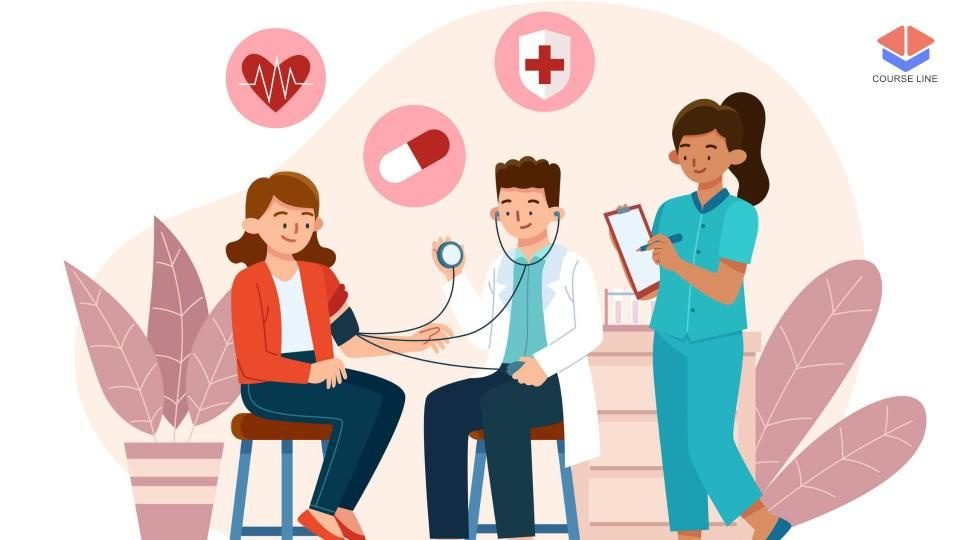Course Features
Price
Study Method
Online | Self-paced
Course Format
Reading Material - PDF, article
Duration
15 minutes
Qualification
No formal qualification
Certificate
At completion
Additional info
Coming soon
- Share
Overview
Effective communication is the backbone of successful operations within public services, especially in high-stakes situations where clarity, precision, and authority can save lives. The Public Services Communication Skills: Radio, Report & Verbal Command course offers a deep dive into the practical communication tools used daily by professionals in the police, fire service, ambulance teams, and other uniformed roles. It begins with foundational concepts, including the types and purposes of communication, the role of clear messaging in emergencies, and strategies for overcoming barriers to understanding.
As the course progresses, learners gain hands-on knowledge of radio communication, including the use of call signs, phonetic alphabets, and best practices for transmitting information clearly and efficiently. Through simulations and incident-based scenarios, students will practice using radio systems in real-world contexts to build confidence and situational awareness.
Verbal command skills are another key focus, helping learners develop the tone, presence, and clarity needed to issue instructions, manage crowds, and defuse conflict. These verbal skills are enhanced by modules on interpersonal communication, team coordination, and emotional intelligence—critical abilities when working under pressure or leading others in the field.
The course also covers professional report writing, ensuring learners can document incidents accurately and in line with legal and procedural requirements. Participants will complete practical report-writing tasks and receive feedback to improve clarity, structure, and evidential integrity.
By the end of the course, learners will participate in a final simulation, combining radio use, verbal commands, and report submission in realistic scenarios. This holistic approach prepares learners not only to meet current public service communication standards but also to stand out in recruitment and advancement within uniformed services.
There are no formal entry requirements, though a basic understanding of English and an interest in public safety or uniformed services is recommended. Learners should be ready to participate in practical simulations and reflective exercises.
Who is this course for?
Effective communication is the backbone of successful operations within public services, especially in high-stakes situations where clarity, precision, and authority can save lives. The Public Services Communication Skills: Radio, Report & Verbal Command course offers a deep dive into the practical communication tools used daily by professionals in the police, fire service, ambulance teams, and other uniformed roles. It begins with foundational concepts, including the types and purposes of communication, the role of clear messaging in emergencies, and strategies for overcoming barriers to understanding.
As the course progresses, learners gain hands-on knowledge of radio communication, including the use of call signs, phonetic alphabets, and best practices for transmitting information clearly and efficiently. Through simulations and incident-based scenarios, students will practice using radio systems in real-world contexts to build confidence and situational awareness.
Verbal command skills are another key focus, helping learners develop the tone, presence, and clarity needed to issue instructions, manage crowds, and defuse conflict. These verbal skills are enhanced by modules on interpersonal communication, team coordination, and emotional intelligence—critical abilities when working under pressure or leading others in the field.
The course also covers professional report writing, ensuring learners can document incidents accurately and in line with legal and procedural requirements. Participants will complete practical report-writing tasks and receive feedback to improve clarity, structure, and evidential integrity.
By the end of the course, learners will participate in a final simulation, combining radio use, verbal commands, and report submission in realistic scenarios. This holistic approach prepares learners not only to meet current public service communication standards but also to stand out in recruitment and advancement within uniformed services.
There are no formal entry requirements, though a basic understanding of English and an interest in public safety or uniformed services is recommended. Learners should be ready to participate in practical simulations and reflective exercises.
Requirements
Effective communication is the backbone of successful operations within public services, especially in high-stakes situations where clarity, precision, and authority can save lives. The Public Services Communication Skills: Radio, Report & Verbal Command course offers a deep dive into the practical communication tools used daily by professionals in the police, fire service, ambulance teams, and other uniformed roles. It begins with foundational concepts, including the types and purposes of communication, the role of clear messaging in emergencies, and strategies for overcoming barriers to understanding.
As the course progresses, learners gain hands-on knowledge of radio communication, including the use of call signs, phonetic alphabets, and best practices for transmitting information clearly and efficiently. Through simulations and incident-based scenarios, students will practice using radio systems in real-world contexts to build confidence and situational awareness.
Verbal command skills are another key focus, helping learners develop the tone, presence, and clarity needed to issue instructions, manage crowds, and defuse conflict. These verbal skills are enhanced by modules on interpersonal communication, team coordination, and emotional intelligence—critical abilities when working under pressure or leading others in the field.
The course also covers professional report writing, ensuring learners can document incidents accurately and in line with legal and procedural requirements. Participants will complete practical report-writing tasks and receive feedback to improve clarity, structure, and evidential integrity.
By the end of the course, learners will participate in a final simulation, combining radio use, verbal commands, and report submission in realistic scenarios. This holistic approach prepares learners not only to meet current public service communication standards but also to stand out in recruitment and advancement within uniformed services.
There are no formal entry requirements, though a basic understanding of English and an interest in public safety or uniformed services is recommended. Learners should be ready to participate in practical simulations and reflective exercises.
Career path
Effective communication is the backbone of successful operations within public services, especially in high-stakes situations where clarity, precision, and authority can save lives. The Public Services Communication Skills: Radio, Report & Verbal Command course offers a deep dive into the practical communication tools used daily by professionals in the police, fire service, ambulance teams, and other uniformed roles. It begins with foundational concepts, including the types and purposes of communication, the role of clear messaging in emergencies, and strategies for overcoming barriers to understanding.
As the course progresses, learners gain hands-on knowledge of radio communication, including the use of call signs, phonetic alphabets, and best practices for transmitting information clearly and efficiently. Through simulations and incident-based scenarios, students will practice using radio systems in real-world contexts to build confidence and situational awareness.
Verbal command skills are another key focus, helping learners develop the tone, presence, and clarity needed to issue instructions, manage crowds, and defuse conflict. These verbal skills are enhanced by modules on interpersonal communication, team coordination, and emotional intelligence—critical abilities when working under pressure or leading others in the field.
The course also covers professional report writing, ensuring learners can document incidents accurately and in line with legal and procedural requirements. Participants will complete practical report-writing tasks and receive feedback to improve clarity, structure, and evidential integrity.
By the end of the course, learners will participate in a final simulation, combining radio use, verbal commands, and report submission in realistic scenarios. This holistic approach prepares learners not only to meet current public service communication standards but also to stand out in recruitment and advancement within uniformed services.
There are no formal entry requirements, though a basic understanding of English and an interest in public safety or uniformed services is recommended. Learners should be ready to participate in practical simulations and reflective exercises.
-
-
- Premium Certificate 00:15:00

No Reviews found for this course.
Is this certificate recognized?
Yes, our premium certificate and transcript are widely recognized and accepted by embassies worldwide, particularly by the UK embassy. This adds credibility to your qualification and enhances its value for professional and academic purposes.
I am a beginner. Is this course suitable for me?
Yes, this course is designed for learners of all levels, including beginners. The content is structured to provide step-by-step guidance, ensuring that even those with no prior experience can follow along and gain valuable knowledge.
I am a professional. Is this course suitable for me?
Yes, professionals will also benefit from this course. It covers advanced concepts, practical applications, and industry insights that can help enhance existing skills and knowledge. Whether you are looking to refine your expertise or expand your qualifications, this course provides valuable learning.
Does this course have an expiry date?
No, you have lifetime access to the course. Once enrolled, you can revisit the materials at any time as long as the course remains available. Additionally, we regularly update our content to ensure it stays relevant and up to date.
How do I claim my free certificate?
I trust you’re in good health. Your free certificate can be located in the Achievement section. The option to purchase a CPD certificate is available but entirely optional, and you may choose to skip it. Please be aware that it’s crucial to click the “Complete” button to ensure the certificate is generated, as this process is entirely automated.
Does this course have assessments and assignments?
Yes, the course includes both assessments and assignments. Your final marks will be determined by a combination of 20% from assignments and 80% from assessments. These evaluations are designed to test your understanding and ensure you have grasped the key concepts effectively.
Is this course accredited?
We are a recognized course provider with CPD, UKRLP, and AOHT membership. The logos of these accreditation bodies will be featured on your premium certificate and transcript, ensuring credibility and professional recognition.
Will I receive a certificate upon completion?
Yes, you will receive a free digital certificate automatically once you complete the course. If you would like a premium CPD-accredited certificate, either in digital or physical format, you can upgrade for a small fee.
Course Features
Price
Study Method
Online | Self-paced
Course Format
Reading Material - PDF, article
Duration
15 minutes
Qualification
No formal qualification
Certificate
At completion
Additional info
Coming soon
- Share
Health & Care Level 8 Advanced Diploma
Course Line238¥4,719.98Original price was: ¥4,719.98.¥144.39Current price is: ¥144.39.Dropshipping
Course Line239¥4,719.98Original price was: ¥4,719.98.¥144.39Current price is: ¥144.39.RQF Level 3 Diploma in Early Years Childcare and Development
Course Line237¥4,719.98Original price was: ¥4,719.98.¥144.39Current price is: ¥144.39.
Related Courses
Exploring Career Paths in Public and Uniformed Services
¥4,719.98Original price was: ¥4,719.98.¥144.39Current price is: ¥144.39. 237
237Conflict Resolution & De-escalation in Public Services
¥4,719.98Original price was: ¥4,719.98.¥144.39Current price is: ¥144.39. 237
237Border Security & Counterterrorism Awareness
¥4,719.98Original price was: ¥4,719.98.¥144.39Current price is: ¥144.39. 237
237
Related Courses
Exploring Career Paths in Public and Uniformed Services
¥4,719.98Original price was: ¥4,719.98.¥144.39Current price is: ¥144.39. 237
237Conflict Resolution & De-escalation in Public Services
¥4,719.98Original price was: ¥4,719.98.¥144.39Current price is: ¥144.39. 237
237Border Security & Counterterrorism Awareness
¥4,719.98Original price was: ¥4,719.98.¥144.39Current price is: ¥144.39. 237
237








